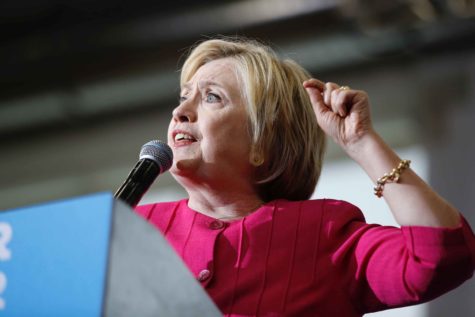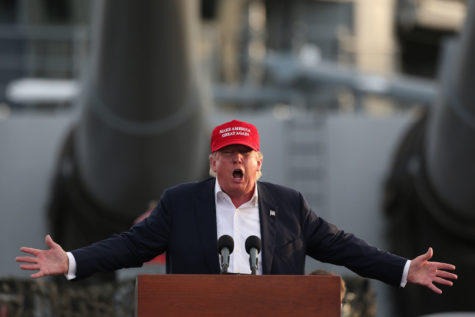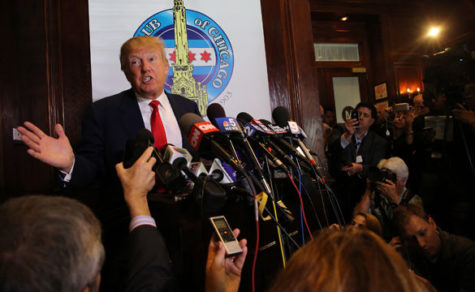Column: Anger that produced Trump won’t go away, even if he loses
Donald Trump supporters get fired up at a Trump rally at the Travis County Exposition Center on Tuesday, Aug. 23, 2016 in Austin, Texas. (Jay Janner/Austin American-Statesman/TNS)
August 24, 2016
By my scientific count, there are only two newspaper columnists in the known universe who have not already declared Donald Trump’s presidential campaign dead and buried. One is me.
Having mocked Trump for getting in a Twitter war with a Mexican narcotrafficker way back at the beginning of the campaign, only to see him shoot to the top of GOP polls, I long ago certified this campaign as too bat-guano-crazy to predict.
The other dissenter is the lethally blonde Ann Coulter, whose new book “In Trump We Trust” will be published Tuesday and, if history is any indication, will next be spotted on The New York Times best-seller list.
Advertisement
Coulter, an early and enthusiastic backer of Trump (he essentially adapted her book “Adios, America” as his campaign platform on immigration), has been warning that the polls were undercounting his supporters ever since he started out near the bottom of a 17-candidate Republican field.
And though Trump is trailing by an average of more than 5 percentage points in the Real Clear Politics survey of major opinion polls with about 75 days to go before the election, she is still convinced he’s neck and neck with Hillary Clinton — maybe even ahead.

The main reason, she believes, is that Trump is going to be the biggest beneficiary ever of the so-called Bradley Effect, named for Tom Bradley, a black mayor of Los Angeles who lost the 1982 gubernatorial election in California despite a seven-point lead in the polls on the eve of voting.
Pollsters concluded that a lot of the people they interviewed didn’t want to admit they were voting against a black candidate. The Bradley Effect — or, if you’re a social scientist, “social desirability bias” — has since become a blanket term for voters who lie to pollsters for fear of violating political-correctness norms.
“Trump has endured $75 million in negative ads from his opponents, and the news media universally hate him,” says Coulter. “A lot of people would rather admit to being Nazi war criminals than to say they’re voting for Trump. But once they’re inside the voting booth, it’s private — no one will ever know they voted for him.”
In fact, argues Coulter, a lot of Trump voters aren’t even being contacted by pollsters, because they’re so alienated from American politics that they aren’t even registered voters — yet.
“In the past, that would be a real problem at this stage of the election,” she says. “But now all these motor-voter laws have made it really easy to register, and you can do it really late. Thank you, Democrats! Democrats are about to learn what a ‘petard’ is.”
Advertisement*
Coulter’s full-front-attack style is not everybody’s cup of tea — even among those who share her conservative politics, there are plenty to whom it tastes more like hemlock. And like her other books, “In Trump We Trust” is sometimes scabrously funny, sometimes just scabrous.

I’m sure I won’t be the last person to laugh at a section on Jeb Bush titled “The Bush Family Collapses, A Nation Rejoices,” or at her merciless lampooning of a talking-head Marco Rubio adviser attacking Trump on TV: “Can you think of a worse item to have on your resume than ‘Rubio adviser’? How about, ‘Fire marshal, The Hindenburg’?”
Venomous punch lines aside, “In Trump We Trust” undeniably brims with insights into the candidate’s appeal, particularly his lock-down-the-borders stance on immigration. His opponents and their courtiers among the chattering classes essentially tried to declare the discussion out of bounds by labeling it racist.
Political reporters added that it was crazy, because nobody they knew was against immigration. But as Coulter notes, Trump’s candidacy took off precisely at the moment he pledged to build that “beautiful wall” on the Mexican border.
Since then, even though he’s spent little money on his campaign and shunned Washington’s hordes of political consultants and their precious focus groups, Trump has become the top vote-getter of all time in Republican primaries.

Perhaps Coulter is wrong about the polls, and Trump will lose in November. But she is clearly correct when she says the lesson of his candidacy is that a lot of Americans are unhappy about immigration and refuse to allow the argument to be circumscribed on the grounds of political correctness.
Several recent polls show about three-fifths of Americans think the United States permits too much immigration.
Donald Trump may go away, but the forces that produced him won’t.
Glenn Garvin is a columnist for the Miami Herald. Readers may email him at [email protected].
___
(c) 2016 Miami Herald
Visit Miami Herald at www.miamiherald.com
Distributed by Tribune Content Agency, LLC.
Advertisement








